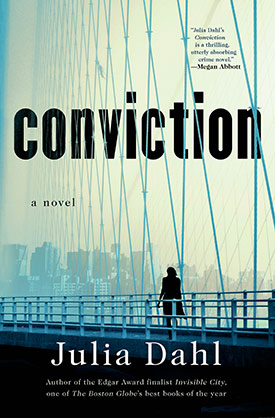 Conviction by Julia Dahl is the 3rd book in the Rebekah Roberts series (available March 28, 2017).
Conviction by Julia Dahl is the 3rd book in the Rebekah Roberts series (available March 28, 2017).
In the summer of 1992, a year after riots exploded between black and Jewish neighbors in Crown Heights, a black family is brutally murdered in their Brooklyn home. A teenager is quickly convicted, and the justice system moves on.
Twenty-two years later, journalist Rebekah Roberts gets a letter: I didn't do it. Frustrated with her work at the city’s sleaziest tabloid, Rebekah starts to dig. But witnesses are missing, memories faded, and almost no one wants to talk about that grim, violent time in New York City—not even Saul Katz, a former cop and her source in Brooklyn’s insular Hasidic community.
So she goes it alone. And as she gets closer to the truth of that night, Rebekah finds herself in the path of a killer with two decades of secrets to protect.
CHAPTER ONE
Morning
July 5, 1992
Crown Heights, Brooklyn
The little boy walked to the storefront church alone, with blood on his hands and face.
Dorothy Norris arrived early, as usual, to lift the gate and set out the worship programs she’d photocopied the night before. She found him standing on the sidewalk, eyes unfocused, feet bare.
She bent down. “Ontario, where are your parents?”
He didn’t answer. It was already eighty degrees, but his teeth were chattering.
Dorothy used her key and ushered him inside, flipped the lights, and walked straight to the phone in the pastor’s tiny office. She dialed Ontario’s foster parents, but no one answered, so she called Pastor Green, and then she called her husband and told him to stay home with the girls until she knew what was going on.
Dorothy asked and asked and asked, but Ontario wouldn’t say a word.
Redmond Green’s wife, Barbara, answered the phone at his apartment. Red was in the bathroom scribbling last-minute sermon notes in a rare moment of solitude. Barbara sent fourteen-year-old Red Jr. to bang on the door and summon his father. Barbara hadn’t asked for details—Just go, she told her husband—and as he walked the eleven blocks between their apartment and the church, he worked himself up, convinced the metal gate had been defaced again. Since opening Glorious Gospel on Easter morning 1982, Pastor Green had been losing a battle with vandals. He called the police often, but they rarely came to take a report. He knew that most of the officers in the precinct thought his crusade silly, given the many miseries plaguing the neighborhood, but he wasn’t about to stop calling. In 1992, one year after the riots, Crown Heights was still a disaster. A battlefield and a garbage dump. It was getting hot again, and everyone seemed to hold their breath, waiting for the neighborhood to explode.
Pastor Green found the gate up when he arrived at Glorious Gospel. Dorothy Norris was inside with Malcolm and Sabrina Davises’ foster son, Ontario. The pastor’s first thought was that the boy had been attacked on his way to church. But Ontario was wearing sleep clothes, not church clothes.
“Something’s happened at the Davises’,” said Dorothy.
“What?”
“He won’t say.”
“Ontario? Are you hurt?”
Ontario stared at the pastor. Past him, really. Through him. Pastor Green kneeled down and touched his arm.
“He’s freezing cold,” he said, looking up.
“I think he’s in shock,” said Dorothy.
Ontario’s face was smeared with red. If the pastor had to guess, he would say that the boy had rubbed his eyes with his bloody hands.
“Is this his blood?”
Dorothy lowered her voice. “I don’t think so. But I don’t know.”
“Have you called the precinct?” asked Pastor Green.
“Yes,” said Dorothy.
The pastor turned back to the boy.
“Ontario. Can I make sure you’re not hurt?” He took the boy’s right hand, turned it over, looked up and down his arm. He repeated the inspection on the boy’s left arm. “Is it all right if I lift your shirt?” Ontario was still. “I just want to see if there are any scratches or cuts.… Good. Looks good. Ontario? Will you turn around for me? Just to check your back.” As he turned, Pastor Green put his fingers on the boy’s neck, and then his skull. “Good. Looks like you’re okay.”
He put his hand on his knee to straighten up, and as he did, Ontario vomited. Right on the pastor’s Sunday wingtips. The boy’s eyes widened and filled with tears.
“Oh, honey,” said Dorothy, leaning down. “It’s okay.”
“It’s all right, son,” said Pastor Green. “Nothing a little water won’t fix up.”
Dorothy walked Ontario to the bathroom to wash out his mouth.
A voice came from the front door.
“NYPD.”
Copyright © 2017 Julia Dahl.
To learn more or order a copy, visit:
opens in a new window![]() opens in a new window
opens in a new window![]()
Julia Dahl is a journalist specializing in crime and criminal justice. Her first novel, Invisible City, was named one of the Boston Globe’s Best Books of 2014, won the Macavity, Barry, and Shamus Awards, and was a finalist for an Edgar Award and a Mary Higgins Clark Award. She lives in Brooklyn, N.Y. and writes for CBSNews.com.
